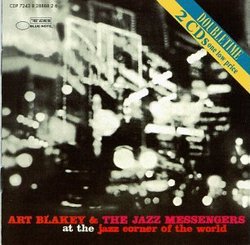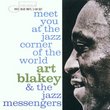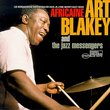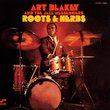| All Artists: Art Blakey Title: At the Jazz Corner of the World Members Wishing: 1 Total Copies: 0 Label: Blue Note Records Release Date: 4/19/1994 Genres: Jazz, Pop Style: Bebop Number of Discs: 2 SwapaCD Credits: 2 UPC: 724382888826 |
Search - Art Blakey :: At the Jazz Corner of the World
 | Art Blakey At the Jazz Corner of the World Genres: Jazz, Pop
This extremely short-lived lineup of Messengers recorded only once together--in April 1959 at New York's Birdland. This engaging and accessible two-CD collection documents this incarnation, which finds tenor Hank Mobley (o... more » |
Larger Image |
CD DetailsSynopsis
Amazon.com essential recording This extremely short-lived lineup of Messengers recorded only once together--in April 1959 at New York's Birdland. This engaging and accessible two-CD collection documents this incarnation, which finds tenor Hank Mobley (one of the earliest Messengers) returning to the fold as a stopgap between recently departed Benny Golson and soon-to-join Wayne Shorter. The remainder of the quintet--Lee Morgan, pianist Bobby Timmons, and bassist Jymie Merritt--are all holdovers from the classic Moanin' lineup, which remains Blakey's funkiest. Mobley adds three compositions to a repertoire that includes Thelonious Monk's tricky "Justice," Ray Bryant's irresistibly groovy "Chicken an' Dumplins," and Randy Weston's easy-swaying "Hi-Fly." Morgan and Mobley are in typically fine form throughout this in-the-pocket set. --Marc Greilsamer Similar CDs
|
CD ReviewsMobs Is the Man Samuel Chell | Kenosha,, WI United States | 04/22/2006 (5 out of 5 stars) "This is the same group as the one on Art's best-selling "Moanin'" album with the exception of Hank Mobley, who replaces Benny Golson on tenor saxophone. It's Mobley's presence that makes all of the difference, so much so that I would rank this session with another two-fer recording at the same location, "Art Blakey at Birdland," which tries to complement the undeniable genius of Clifford Brown with the pedestrian playing of Lou Donaldson.
Previous reviewers have pointed out the brilliance of Lee Morgan's solo on "Justice" (Monk's "Evidence," renamed by Blakey for reasons that elude me), but listen to the strong follow-up on the same tune by Mobley. The drive, the ideas, the quote ("Sonny Boy"), and the passion all contribute to a stirring solo that simply picks up where Morgan left off. (The same Monk tune is featured, but with its more popular title, "Evidence," on a Bluebird CD of a slightly earlier session with Golson--"Art Blakey and the Jazz Messengers: Paris, 1958." Morgan's solo, though completely different on this occasion, is equally inventive.) As usual Mobley is a story-teller of the first order, making every phrase count (a striking contrast to the garrulous pyrotechnics of a Golson solo). The ensemble spirit, the announcements of Blakey and Pee Wee Marquette, the interaction among the musicians and crowd--this was another unrepeatable musical event that you won't want to be without. If there's a caveat, it's my personal aversion to some of the mixing choices made by recording engineer Rudy Van Gelder. He brings each player front and center but at the expense of ensemble "depth" and occasionally of individual tonal expressiveness. Mobley's sound is unnecessarily and uncharacteristically hard-edged and testosterone-soaked, making him sound harsh and even on the verge of distortion at times. Fortunately, I have enough other recordings by Mobley before, during, and after this one to know better. [My thanks to a reader who explained the "Justice"/"Evidence" confusion. Monk wrote a tune based on the changes to "Just You, Just Me," so he called it "Just Us," which metamorphosed phonetically into "Justice," which in turn metamorphosed semantically into "Evidence." At least on this particular night, Art must have had a preference for the earlier title.]" |

 Track Listings (5) - Disc #1
Track Listings (5) - Disc #1

